The 2018 Survival Guide for U.S. Travel Agents by Travel Agent Central
January 7, 2018
Travel Agent 2018 Survival Guide for U.S.
Jennifer Doncsecz, president of VIP Vacations, and Emily Bertsch, office manager of VIP Vacations, were interviewed for Travel Agent Central’s article “The 2018 Survival Guide for U.S. Travel Agents”.
From fears of terrorism to the continued growth of Airbnb, agents were faced with a handful of obstacles to overcome in 2017. And whether it was the negative impact of fake or inaccurate news reports, the concerns caused by devastating hurricanes, the reversal of travel-friendly Cuba policies, or lingering concerns over the Zika virus, these challenges don’t appear to be diminishing in the year ahead. In addressing such issues, Travel Agent and some of the industry’s best advisors have come up with some solutions to tear down, go around or break through the walls standing between you and a stronger bottom line.
Battling Fake News
The Challenge: President Trump may have made the phrase famous, but fake or exaggerated news has been around since the beginning of time.
Now, although some people tend to overplay the fake news card to get out of a pinch, there is no denying that sloppy journalism has been made more prevalent by the Internet and the scores of online “news” platforms that don’t exactly adhere to a code of journalistic integrity.
And although fake news has become the punchline of so many jokes in this tense political climate, when it comes to travel advisors, it can be a very serious, financial problem.
For example, when the U.S. State Department issued a security update for Mexico, warning travelers of allegations of tainted alcohol at all-inclusive resorts back in July, both advisors and hoteliers began to feel the effect. Even after several government-run tests found no tainted alcohol present at the resorts in question, the story, like the old-fashioned game of “telephone,” had already been twisted and manipulated on Twitter.

At VIP Vacations, says Jennifer Doncsecz, agents assure customers that “first and foremost, our clients’ safety, security and comfort are our number-one priority.”
“Travel consultants are constantly having to juggle with our personal opinion on a current event or news story and providing fair and balanced guidance to our clients,” says Jennifer Doncsecz, president of VIP Vacations, Inc. “Many times, the news over-sensationalizes their coverage of a story and — let’s face it — fear sells.”
And just when the panic surrounding the tainted alcohol allegation began to fade, the U.S. Department of State on August 22 issued an updated travel warning on Mexico, including such popular tourism destinations as Cancun, Cozumel, Riviera Maya and Los Cabos.
According to the caveat, the U.S. Department of State “warns U.S. citizens about the risk of traveling to certain parts of Mexico due to the activities of criminal organizations in those areas,” adding that, “U.S. citizens have been the victims of violent crimes, including homicide, kidnapping, carjacking and robbery in various Mexican states. This Travel Warning replaces the Travel Warning for Mexico issued December 8, 2016.”
But despite the notation that the warning was an update from a previous one, there are many clients who might make the mistake of thinking this is a brand-new advisory. And there are also some clients who might miss the fact that none of these incidents involved tourists, as the warning also states.
The Solution: As far as fake news in general goes, advisors should make sure they are getting their facts from credible news organizations as well as State Department websites.
“Travel agents win by selling what they know and selling what they have personally experienced,” says Mitch Toren of Trip Guy Travel. “It’s our job to fairly and accurately report on the true conditions, good or bad. This is where we differ from an online agency that is just providing prices. We need to properly educate our clients on what risk exists and how to mitigate risks, but our firsthand experiences in places like Mexico are what truly make our clients more comfortable that these issues aren’t as wide-spread or accurate as the media would lead the public to believe.”
And Doncsecz also advises agents to leave their opinions out of a business call with clients whether they agree with the client or not.
“At VIP Vacations, we encourage our clients to do their due diligence and use a discerning eye because making changes, or cancelling their reservations can result in fees or loss of their hard-earned money,” she tells Travel Agent. “We also say that first and foremost, our clients’ safety, security and comfort are our number-one priority. When we were dealing with the updated Mexico travel advisory this past summer, we looked at the Global Crime Index — and sent our clients the link that is updated daily.”
Also, it is important to be very clear to clients that the travel advisory is an updated warning from December 8, 2016, and that it clearly states that no tourists have been involved.
“With regards to the State Department reissuing the travel advisory, I remind them it is not a new warning. They just updated it as they normally do. The State Department warning is issued with an abundance of precaution,” says Michael McHugh of Dream Makers Vacations Services.
“I try to put these situations in perspective for the client,” continues McHugh. “If they live around New York, I’ll remind them that there are parts of the city where you feel safe and other parts of the city that you wouldn’t go at night. Use common sense when traveling. You wouldn’t walk down a dark alley alone at 3 a.m. at home, [so] don’t do it on vacation.”
Andrey Zakharenko of Always Travel also thinks it’s important for a client to hear whether news is being exaggerated from a travel professional’s standpoint.
“My approach with clients about the news is to tell them that most of it is overblown and all the news did is made the destination a better value for you,” says Zakharenko.
Selling the Caribbean
The Challenges: The back-to-back category 5 hurricanes that ravaged the Caribbean in September didn’t just wreak havoc on the islands. Maria and Irma also created mass confusion among the traveling public as to what was and wasn’t open for tourism business in the Caribbean. Throw in lingering concerns over Zika and President Trump’s plans to further tighten travel restrictions to Cuba and there are certainly some obstacles surrounding selling the Caribbean in 2018.
Trump announced a plan back in November to restrict an outreach program from allowing non-sponsored groups to visit Cuba for the purpose of culture and education. The “People-to-People” initiative requires Americans to take part in various cultural experiences in Cuba, essentially, as the name implies, putting them in direct contact with the people of Cuba with hopes of learning about the way of life in the country. It was implemented by President Clinton in 1999 and suspended by President Bush in 2004 before President Obama resurrected the program.
Under Trump’s new proposal, the program will now be permitted only for sponsored groups in the United States, and with the participation of representatives from those groups.
Back in mid-November, Terry Dale, president and CEO of the United States Tour Operators Association (USTOA), released a statement calling Trump’s Cuba regulations proposal “counter to USTOA’s core belief in freedom of travel for Americans.”
Individuals traveling under the “People-to-People” outreach program will no longer be able to visit the country, except where travel arrangements have already been made, or in cases where these individuals are accompanied by permitted, U.S.-based sponsors, according to CNN.
“Cuba interest has waned for a few reasons, but the president’s policies have definitely made it more risky for people to want to go,” says Toren. “There is no guarantee that even the existing policies won’t be changed yet again in 2018.”
The Solutions: As far as Zika goes, it may not be as big as an obstacle as it was in 2016, but the Zika scare hasn’t fully gone away and isn’t expected to in 2018, according to several advisors Travel Agent has spoken to on the subject.
“Zika is definitely still a concern,” says Emily Bertsch of VIP Vacations, Inc. “Of all the weddings we have booked for 2017 and 2018, we get at least one guest in each wedding that cancels because she found out that she is pregnant and her doctor advised her not to travel.
“I try to put myself in their shoes and decide if I would still travel,” says Bertsch. “I say yes, I would still travel, but if I was an expecting mother, I may have a different opinion even knowing there is a very minimal chance that my unborn child could be harmed.”
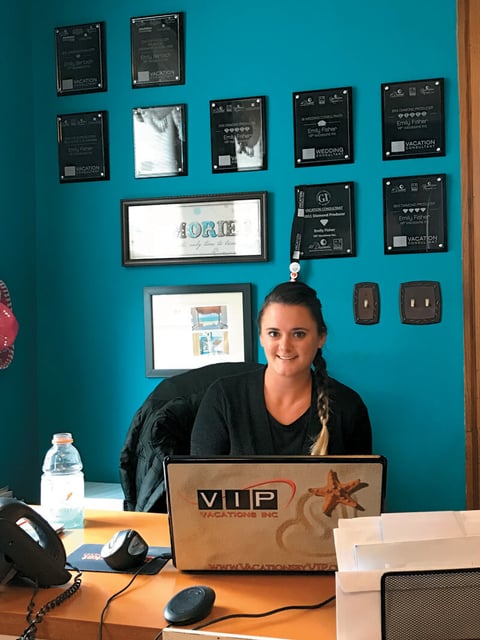
VIP’s Emily Bertsch: “Zika is still a concern…I try to put myself in [pregnant travelers’] shoes.”
As far as Cuba goes, many operators and agents are continuing to sell it like business as usual. After all, none of Trump’s proposals are final yet. And travel to Cuba is still legal under several conditions, including the People-to-People program.
“Cuba, a hot destination in 2017, is full of fake news,” says Zakharenko of Always Travel, “and as long as it makes it easier for U.S. tourists to travel to the country, they believe it and if it makes it harder and more expensive, they don’t.”
But if you want to be on the safe side, Toren recommends advisors book Cuba cruises.
“Cruising seems to be the safest option, but also eliminates the opportunity for the travelers to truly integrate themselves in the country,” Toren tells Travel Agent. “There still needs to be a ‘level-setting’ of expectations around people visiting Cuba. It’s not all great music, history and cigars. It’s still very much a Third World country for people expecting the romance of the ’50s.”
And as far as hurricanes go, it’s important to inform the client that most of the Caribbean, including major islands like Jamaica, Aruba, the Cayman Islands, the Bahamas, Barbados, Grenada and St. Lucia, were all completely untouched, while islands such as Antigua, Anguilla and Turks and Caicos all sustained minimal damage and are open for tourism.
But for a complete and thorough list of where agents can sell in the Caribbean, advisors should contact their tour operators as most of them have partnered with the Caribbean Tourism Organization on promotional campaigns to create awareness for the unaffected islands.
Booking Window Uncertainty
The Challenge: It took a long time for booking windows to return to normal following the recession of 2009. And while many agents are still reporting travelers booking months out, there are some clients that are beginning to book last minute due to the wait-and-see game created by natural disasters, terrorism, unpredictable weather and political tension.
“We do not see our clients changing their booking patterns as a result of recent world events,” says Toren. “People who like to travel and experience new things are still continuing to travel, and still booking early. We have numerous clients already asking us for fall / winter 2018 / 2019 travel since they want to get the best prices for the best product, which tends to be the places that sell out early.”
The Solution: Be prepared for both booking months out and weeks out alike. In 2009, the short booking windows had more to do with job uncertainty.
In 2017 and heading into 2018, short windows are due to a handful of reasons from value hunters looking for a good, last-minute travel deal to the influence of the media’s coverage of everything from Zika to terrorism.
“We’ve seen booking windows go both ways,” says Bertsch. “We’ve had more bookings two years out this year, than ever before. However, we are still getting a lot of last-minute vacations [within two months of travel]. And last week, I even got an inquiry for someone that wanted to travel in 13 days. I do think that as the year begins, we will continue getting more of these short windows though, as people are uncertain about the economy and the world happenings, and rather than getting insurance to cover them, they would wait until the last minute to book anything.”
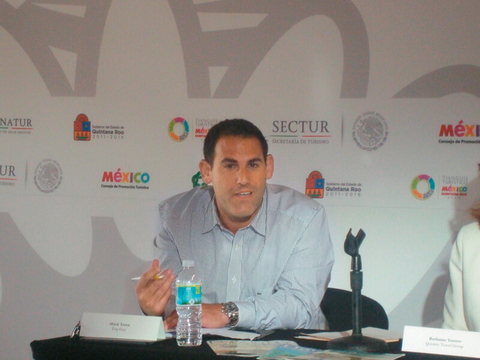
“We do not see our clients changing their booking patterns as a result of recent world events,” says Trip Guy Travel’s Mitch Toren.
The Changing Luxury Paradigm
The Challenges: Our sister publication, Luxury Travel Advisor, surveyed advisor attendees of its Ultra Trendsetters conference in September and found that one of the greatest challenges in the luxury market is convincing clients that they need to book early to get the top suites in hotels and on cruise ships.
Why? Because there are only so many amazing suites overlooking the Amalfi Coast or on an oceanliner and there is just a limited number of private yachts and jets that can be rented out.
That means the ultra-affluent client who decides to book at the last minute might not get what they want; a rude awakening even for those for whom money is no object.
“Clients are booking closer in, and there are only so many top suites in each destination. Some do not understand that they are competing for space with people who have similar or higher resources at their disposal,” said one advisor.
“With a growing number of high-dollar vacations booking 30 days before departure, booking the perfect room, the perfect yacht charter, etc., becomes increasingly difficult,” said another. “Alternative sources must be used to get the inventory our clients are craving.”
The Solution: Luxury travel advisors need to sit their clients down and explain to them that business is good right now in luxury and demand is high, so it’s optimal to make plans even a year out if they want something special.
Of course, human nature will not allow some clients to revert to that behavior so another solution is for advisors to have a cheat sheet of alternative hotels and suppliers than can provide high-end options in key destinations.
Another option? Look beyond the obvious five-star brands for unique experiences for your clients. These Ultra Trendsetters noted with joyful optimism that hoteliers are increasingly making changes to suit the evolving customer by opening unique properties that relate to their destination.
“Luxury is no longer just a five-star hotel! It can be a part of the experience, but clients want more contact with the city they are visiting,” said one advisor.
Another echoed that sentiment: “There is interest in smaller boutique ‘apartment-like’ hotels where clients can feel like a local but still have all the amenities of a luxury hotel.”
“Boutique hotels are becoming a very important part of what I offer,” said a third.
The challenge here is that learning about so many smaller hotels takes time but it’s something advisors will have to focus on. Teaming up with travel industry sales reps who focus on independent hotels is one solution; if you can trust the selections they make for their portfolios you can trust in booking their properties. At the end of the day, however, independent hotels can best be verified if they already belong to a luxury hotel group that’s already vetted the property’s offerings.

The Treehouse at Papaya Playa Project in Tulum, Mexico, is one example of unique properties that hoteliers are opening to suit the evolving guest’s desire to relate to their destination.
Good to know: Advisors attending the Ultra Trendsetters conference all reported that business is great. The rising stock market is spurring consumer confidence and affluent travelers are demonstrating pent-up demand to travel. Some are even planning earlier out than usual to ensure they’ll get what they want and many are taking multiple vacations a year.
The Trendsetter advisors are dealing with this strong influx of business by restructuring their business so they’re dealing only with “repeat and referral” clients.
“I’ve reached above 80 percent repeat business year over year with all of my new clients referred by prior clients,” said one advisor. “This allows me to build deeper relationships than I ever imagined with our clients. The outgrowth of this model is that I manage an extraordinary amount of multigenerational travel and my reach has expanded so I’m working with the mothers, brothers, sisters, wives and the closest friends of my clients.”
The Evolution of Wellness Travel
The Challenge: The increasing demand for wellness vacations, especially those that go beyond the spa. We’re not sure who’s going to be more active this year — you, booking all the new wellness trips available, or your clients, who will be the ones enjoying the increased offerings in 2018.
Booking.com, which reserves 1.5 million room nights each day, has reported that wellness getaways might be more than a trend. Their numbers show almost double the amount of people planning to take a health and wellness trip in 2018 compared to 2017. Last year, it was roughly 10 percent of travelers, in 2018, it is expected to be 20. Coming in as Booking.com’s most popular wellness getaway is walking vacations, with 56 percent of travelers expecting to go on a walking or hiking trip in 2018.
Other popular activities, according to the same report, are visiting a spa/receiving beauty treatments (33 percent), cycling (24 percent), water sport activities (22 percent), full-body detox holidays (17 percent) and yoga retreats (16 percent). This follows a similar trend that more travelers are looking for experiences rather than things (according to Booking.com’s survey, 59 percent of travelers prioritize experiences).
The Solution: Now that it’s clear you will probably be booking your fair share of wellness getaways, here are some trends within the segment you can use to qualify your clients. Travelers in 2018 will be looking for: preventative health resorts with on-site doctors and intensive regimens; architecture designed with the physical and mental wellbeing of people taken into consideration; vacations after non-celebratory life events such as a break up or divorce where travelers may be looking to manage stress; new technology available at hotels and resorts such as anti-aging spa treatments or body composition-measuring tools; “happy retreats,” where travelers partake in serotonin-spiking treatments; holistic treatments that include concepts ranging from crystal and energy healing to reiki and light therapy; locally sourced products that help support the community; scientific data (for instance, some resorts have shown guests how their DNA affects their wellbeing), and more.

Yoga pavillion at Gansevoort Turks and Caicos: One in six wellness travelers now seek yoga retreats, according to Booking.com.
Fears of Terrorism
The Challenge: The threat is not going away anytime soon. The bombing of a London Underground station, attacks in Barcelona and Cambrils, Spain, and two recent incidents in New York City are some reminders of this. There are also concerns that the rioting in the Middle East following President Trump’s declaration recognizing Jerusalem as the capital of Israel may have a ripple effect. USTOA members cited terrorism as the number-one challenge for 2018, followed by political instability and global financial instability.
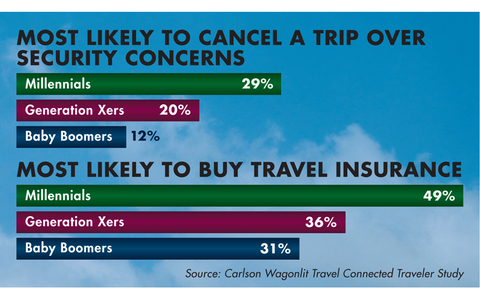
The Solution: If clients are deeply concerned about terrorism, steer them to equivalent alternate destinations that are deemed or perceived to be safe, as well as domestic vacations.
Also, if you are selling Europe or another region affected by terrorism or terrorist threats, you need to pitch to seasoned travelers. The first-timer is more easily scared off by media reports whereas the experienced jetsetter may see opportunity in visiting a place people are shying away from simply because of the value such places will offer in order to keep tourism afloat.
There is hope: According to the 2017 Ensemble Insights Survey, 43 percent of respondents said world events such as terrorism, protests and election results have had “little to no change” in their travel bookings for 2017 and 2018. Thirty-four percent indicated their clients were placing a greater reliance on booking with a travel professional; 32 percent noted an increased interest in lesser-known destinations for their vacations; and 31 percent reported an increase in travel insurance bookings. (Members could choose multiple answers for the question.)
The Workplace Environment
The Challenge: Maintaining a professional, friendly, harassment-free environment. Sexual misconduct is not limited to the worlds of entertainment and politics, and claims of such incidents can prove costly.
The Solution: Be more cognizant of and sensitive to any potential incidents that could arise by workplace behaviors. Take any reports on sexual misconduct seriously. Consider conducting a workshop, perhaps engaging a legal expert to lead it.
The Challenge: Hiring the right person for the job. According to a report from CareerBuilder, companies lost an average of $14,900 on every bad hire in the last year. It’s a common mistake — nearly three in four employers surveyed by CareerBuilder (74 percent) said that they’ve hired the wrong person for a position. Ripple effects cited by employers include less productivity (37 percent), lost time to recruit and train another worker (32 percent) and compromised quality of work (31 percent).
The Solution: Learn to avoid common pitfalls.
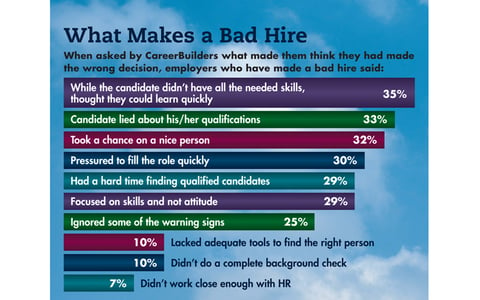
Clarifying the Cuba Conundrum
Terry Dale, president and CEO of the United States Tour Operators Association (USTOA), clarified Cuba travel issues at USTOA’s annual conference in December. Referring to Donald Trump’s recent executive order regarding travel to Cuba, Dale noted that tour operators running escorted programs in Cuba are not affected; however, those who want to do FIT, or independent travel to the island are.
“That autonomy [to travel independently] is gone,” he said. “Those individuals have to go with the group operator or a group entity that follows the people-to-people [guidelines].”
Dale also cautioned that airlines that had previously added service to Cuba may drop it now that the ability to travel there has been diminished.
“If they can’t fill their seats with individuals and groups, they may pull service. Alaska Airlines pulled their service as an example, and some service was cut back from other airlines, so there are implications to all actions that could affect Cuba, so it’s kind of a double-edged sword,” he added.
Dale said USTOA has done some lobbying regarding Cuba travel; however, he admitted he’s not optimistic about the outcome, considering all of the other issues facing Washington, D.C.
“Senator [Jeff] Flake has been just an amazing champion of opening up Cuba for all types of travel. Representative [Mark] Sanford has as well,” he said. “Representative [Dina] Titus from Nevada has also been pretty outspoken, so we work with them a lot, but when you weigh what they are juggling and their priorities, I don’t see this gaining a lot of traction.”
Dale said USTOA on its visits to “The Hill” will continue to press forward, but noted that it’s an “uphill battle.”

Restrictions have been re-imposed on visits to Havana and other places in Cuba, making independent travel there virtually impossible.
USTOA: Sales Continue Their Upward Trend
Tour operators are at the front lines of travel and so when the top tour operators in the country say business is booming, you can take that as a good sign that the travel industry is in a very good position.
The United Tour Operators Association (USTOA) recently hosted its annual meeting where it released a member sentiment survey. According to the survey, 84 percent of responding members reported an increase in sales for 2017, half (53 percent) of which cited an increase of 10 percent or higher.
“I can say in my seven years with USTOA, it’s the first time that in talking with our members … virtually every single one has had strong single-digit growth or double-digit growth,” said Terry Dale, president and CEO of USTOA.
More than a third of the tour operators surveyed attributed the growth to an improving economy and consumer confidence; another third attributed increased sales to improved marketing efforts. The dollar is strong against several currencies and competition in the marketplace is keeping some pricing lower. All of these factors combined make it very attractive to go now for all consumer demographics in all price ranges.
It is surprising that consumers continued to travel this year despite concerns about terrorism, which USTOA members cited as the number-one challenge for 2018, followed by political instability and global financial instability.
“There’s a general resiliency out there,” said Dana Santucci, chairman of USTOA and vice president of development at EF Education First.
“People are ready to go,” she added, noting that the companies within USTOA have also evolved their products to meet consumer demands. “They are listening to customer feedback and coming up with new programs that meet all those different needs, such as experiential travel and language emergence, as well as hands-on volunteering.“
Indeed, members in the survey cited arts and culture, adventure, family and culinary as the most popular travel categories for passengers.
New Destinations
It’s possible, however, that concerns about terrorism are pointing travelers in different directions these days. They may be foregoing traditional city center locations in international destinations for places that are more off the grid.
When asked for the five most popular, or “hot,” international destinations for travelers in 2018, tour operator members named Australia, Spain, Iceland and Italy (tied for third), France and Japan. Most of these destinations moved upward from lower rankings last year.
Scott Wiseman, president of Travel Impressions, who also sits on the executive board of USTOA, said that Australia typically sits on the top of people’s wish lists but that may not always be good once they realize the length of the flight to get there.
“But I think people are considering an area that may be safer than some of the other areas and are willing to make that move this year and commit to it,” he said. Wiseman noted as well, however, that the Australia Tourism Board has done a great job of promoting the area and its territories over the past few years. “I think it’s created more awareness in the marketplace, which helps,” he added.
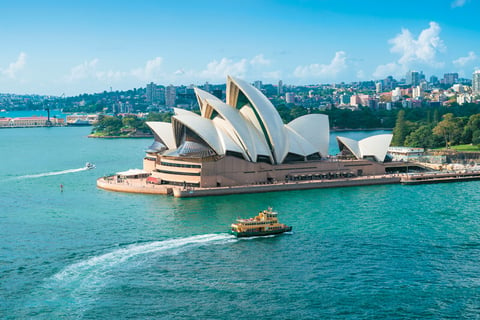
USTOA members cite Australia as the hottest destination topping travelers’ wish lists in 2018.
In terms of resilience, the board noted they were pleased to see France reappear on the top destinations list in light of incidents of terrorism in the past.
On the domestic front, USTOA members forecast California, Florida and Hawaii (tied for second), New York, Alaska and Nevada (tied for fourth) and Washington, D.C. as the most popular U.S. destinations for clients in 2018.
Iceland was named top emerging or “off-the-beaten-path” destination for 2018, moving to the top spot from second in last year’s member survey. Colombia followed in second, with Vietnam named as third.
Travel agents will continue to be an important distribution channel for USTOA members.
For the year ahead, 90 percent of members anticipate the amount of business booked through travel agents to remain the same or increase in 2018. Eighty-four percent of USTOA members report the use of travel agents to sell their product. More than half (53 percent) of USTOA Active Member bookings in 2017 were through a travel agency.
A little more than half (57 percent) of members’ customer base are Baby Boomers at 51 years of age and older. The next largest age group is 35 to 50 years old, representing about a quarter (22 percent) of customers. In addition, a quarter (28 percent) of active members said families represented anywhere from 10-25 percent of their annual passengers. Roughly half (46 percent) reported a growth in solo travelers in 2017 over 2016.
Airbnb Steps Up Its Game
While Airbnb has proved to be more of a talking point than a serious competitor to the travel industry for most of its existence, it is working toward becoming a complete “end-to-end” trip experience, providing travelers with more than just the ability to book rooms. This will definitely be something worth monitoring throughout the year.
The company’s site has already implemented its “Experiences” tab, where consumers can book their own tours, restaurant reservations and other unique experiences. The plan, however, according to Airbnb co-founder Joe Gebbia, is to bring flights, rental cars and split payment applications to the site, as well.
A recent study by Morgan Stanley shows that brand awareness is at an all-time high, and the site is looking to begin competing with the top online travel agencies as quickly as possible. From the same study, Morgan Stanley found that 51 percent of Airbnb users opted for the site over traditional hotels in 2017 — a 2 percent increase from last year.
The report does offer some positive notes, such as growth in the U.S. and Europe has slowed compared to years past. For instance, the percent of travelers using Airbnb was up 330 points in 2017; however it was up 800 points in 2016.
A separate study, conducted by MMGY Global (from its 2017-18 Portrait of American Travelers), shows that luxury travelers (those who spend on luxury travel) who want the very best in accommodations and transportation make up only 36 percent of affluent travelers (those with high incomes). It goes on to say luxury travelers spend 62 percent more on travel than affluent travelers and are significantly more likely to try services such as Airbnb.
According to the same study, luxury travelers spend a household average of $10,078 on leisure travel (or 62 percent more than affluent travelers), and 31 percent of those luxury travelers have plans to take more vacations in the next 12 months. As a large portion of the traveling community and those who spend the most on travel, luxury travelers’ willingness to adopt sharing services could be cause for concern among the travel industry.
Source: Travel Agent Central
To get in touch with a VIP Vacations Inc travel agent click here.




